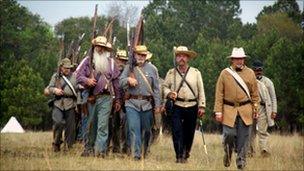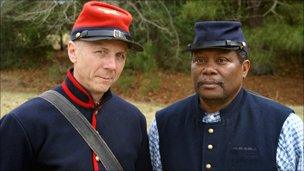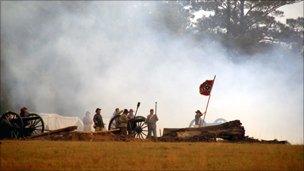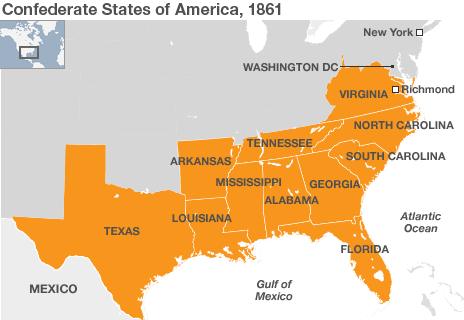US Civil War 150th anniversary: How US remains divided
- Published
Historian Bernard Powers talks to the BBC's Paul Adams about the history of slavery and why it triggered South Carolina to become the first state to secede
The US is commemorating the 150th anniversary of the country's most destructive conflict, the Civil War. In Charleston in the state of South Carolina, where the war erupted, the BBC's Paul Adams says Americans remain divided over the roots of the conflict to this day.
On a patch of open ground near Charleston, the US Civil War came vividly, noisily to life on a rainy Sunday in late March.
Re-enactors played out the 1864 Battle of Bloody Bridge, a victory for Southern, or Confederate, forces over Northern, or Union, troops.
The show was colourful and educational, too.
But here in the cradle of the Civil War, with its sesquicentennial just around the corner, this is a piece of painful history which continues to rankle.

Civil War re-enactments bring together enthusiasts from across the country
The war lasted four years, claiming the lives of more than 600,000 soldiers and an unknown number of civilians. The South was defeated and slavery outlawed.
"It is more politically charged in deep-rooted Southern states," said Shane Miles, who played a Union colonel in distinctive peaked cap and blue uniform.
Some re-enactors are happy to put on either uniform, but others will only ever play one side.
"There are still some people want to re-fight the Civil War," he said, as units of infantry exchanged volleys of rifle fire and Union cannon boomed out across Johns Island, setting off nearby car alarms.
Mr Miles, a native of Tennessee, said many Southerners felt like "second-class citizens in their own country", a condition he attributed to the outcome of America's most devastating war.
States' rights
Some of those looking on at the re-enactment expressed similar sentiments: that the South paid a heavy price for its desire to go it alone and that only one - Northern - version of history persists.
"I think today it's portrayed as being a controversy over class and racism and I don't think that's true," said visitor Sylvia Daniel.
"Actually the cause was individual states' rights."
It's a familiar argument, but insufficient to explain the conflict's roots, said historian Bernard Powers of the College of Charleston.
Annie Chambers Caddell sparked outrage when she decided to hang a Confederate flag from her porch
"You have to go further and ask what states' rights were being violated?"
What the Southern states wanted, he said, was to preserve every aspect of a society which had slavery at its heart.
"No-one who existed at that time would have dared deny that," he said.
But a Harris Interactive poll, external in January found that 54% of Americans believe the South was fighting for states' rights rather than to preserve slavery, with 69% believing the North was fighting to preserve the Union rather than to abolish the institution.
The disagreement persists, despite Abraham Lincoln's observation, in his inaugural address of 1861, that slavery was "the only substantial dispute".
'Slavery underlying all'
So divided do Americans remain about the causes and effects of this epic conflict that Time Magazine's April edition features a weeping Lincoln on its front cover, with the headline "Why We're Still Fighting the Civil War".
On the ferry carrying visitors across Charleston harbour to Fort Sumter, a detailed commentary sets the scene.
"Underlying all the economic, political and social arguments was the issue of slavery," the voice intoned.

Some Civil War re-enactors will don either uniform, while others are loyal to their "side"
The rangers on duty at the place where the war began, in the early hours of 12 April, 1861, know only too well how the war's origins can still inflame passions.
"People still get very emotional," said park ranger Nate Johnson, who added some visitors take issue with the notion that slavery was the root cause of the war.
"Slavery and states' rights are inexorably intertwined," said Mr Johnson, who hails from Wisconsin and is sometimes called a Yankee.
Back in Charleston, by a monument to the Confederates who defended the city to the war's bitter end, an academic with an alternative take on the causes of the war argues that the Confederates were motivated by true American ideals.
"Southerners were of the opinion they were defending the Constitution... against a brutal, materialistic invasion force from the North," said David Aiken, a professor of literature at the College of Charleston and a founding member of the League of the South, which advocates Southern independence.
'Unity or liberty?'
Weren't they also defending their right to own slaves as a key component of the Southern economy?
"Slavery was a national problem," he replied. "People today like to say that slavery was only a... Southern problem. But that's not true."

Ranger Nate Johnson hails from Wisconsin - a Union state - and is occasionally called a Yankee
One hundred and fifty years after the desire to secede triggered a conflagration, Mr Aiken says the idea is not dead.
"What's your greatest value?" he asked. "Unity or liberty?"
The parallels with the America of 2011 are clear. At Tea Party meetings across the country, states' rights is a rebel yell among many who see today's government as overweening and rapacious.
At the Charleston Mercury, a strident mouthpiece for plantation owners at the time of the war, publisher Charles Waring said he wants to "tell our side of the story, come hell or high water".
His anniversary edition features a pair of contrasting essays on the causes of the war, but Mr Waring suggested the South paid a heavy price.
"We have stories in our families about Yankees who burned our plantations, stole our silver, raped our women," he said.

"There are still some people want to re-fight the civil war," re-enactor Shane Mill said
"It's very clear that a South that wished to be independent... was treated like a cur dog."
Historian Bernard Powers, who specialises in African-American history, said it's not hard to understand where these sentiments come from.
"There was something that deeply embedded the Civil War into the mentality of the South, because the South lost," he said on a tour of nearby Boone Hall Plantation, where slave quarters have been restored.
"I think the South is a region that demonstrates... the truth of William Faulkner's statement: The past is not dead. It's not even over."

- Published11 April 2011
- Published11 April 2011
- Published18 February 2011